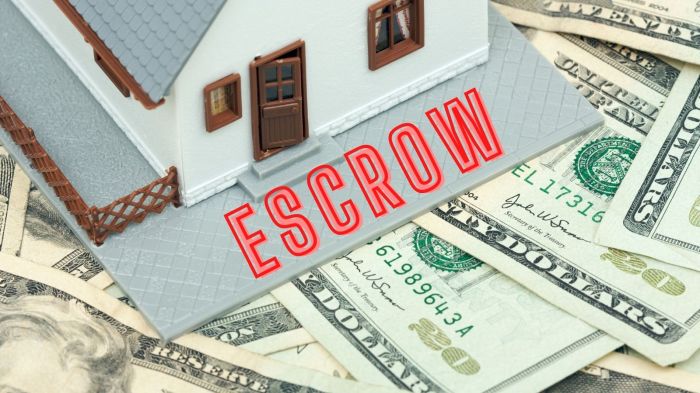Escrow deposit 3 days florida – Navigating the complexities of escrow deposits in Florida can be a daunting task. However, with this comprehensive guide, you’ll gain a clear understanding of the three-day escrow deposit requirement, the types of escrow accounts, and the legal implications involved. Get ready to demystify the escrow process and make informed decisions regarding your real estate transactions.
In Florida, buyers are required to deposit earnest money into an escrow account within three days of the contract being executed. This deposit serves as a guarantee of the buyer’s good faith and intent to purchase the property.
Escrow Deposit in Florida

Escrow deposits, also known as earnest money deposits, are common in real estate transactions in Florida. These deposits are held by a neutral third party, typically a title company or escrow agent, until certain conditions are met or the transaction is completed.
In Florida, escrow deposits are typically held for three days, providing a safety net for both buyers and sellers. This waiting period allows for a thorough review of the contract and any potential issues that may arise. Just like a cat chases a mouse across the room, the escrow process ensures that all parties involved are protected throughout the transaction.
Escrow deposits serve several purposes. First, they demonstrate the buyer’s good faith and commitment to the purchase. Second, they provide the seller with some financial security in case the buyer defaults on the contract. Third, they can be used to cover closing costs or other expenses associated with the transaction.
Examples of Transactions Involving Escrow Deposits in Florida
- The purchase of a home
- The purchase of a condominium
- The purchase of a commercial property
- The sale of a home
- The sale of a condominium
- The sale of a commercial property
Timeframe for Escrow Deposits in Florida: Escrow Deposit 3 Days Florida

In the state of Florida, the law mandates that escrow deposits be made within three business days of the execution of the contract.
The three-day escrow deposit requirement aims to protect both the buyer and seller involved in a real estate transaction. It ensures that the buyer’s earnest money deposit is held securely in an escrow account until the closing date.
Exceptions to the Three-Day Rule
There are certain exceptions to the three-day escrow deposit rule. These exceptions include:
- When the buyer is purchasing a property from a builder or developer.
- When the buyer is using a VA loan or USDA loan to finance the purchase.
- When the buyer and seller agree in writing to extend the escrow deposit deadline.
Consequences of Not Depositing Escrow Funds Within the Timeframe, Escrow deposit 3 days florida
If the buyer fails to deposit the escrow funds within the specified timeframe, the seller may have the right to cancel the contract and retain the earnest money deposit as liquidated damages.
Disputes and Resolution in Escrow Deposits

Escrow disputes can arise for various reasons, including disagreements over the terms of the contract, the handling of funds, or the distribution of assets. These disputes can be complex and require legal intervention to resolve.
In Florida, there are established procedures for resolving escrow disputes. These procedures involve mediation, arbitration, and litigation.
Mediation
Mediation is a form of alternative dispute resolution (ADR) in which a neutral third party (mediator) facilitates a discussion between the disputing parties. The mediator does not make a decision but helps the parties reach a mutually acceptable agreement.
Arbitration
Arbitration is another form of ADR in which a neutral third party (arbitrator) hears evidence and makes a binding decision. Arbitration is generally more formal than mediation and can be more expensive.
Litigation
Litigation is the process of resolving a dispute through the court system. Litigation can be time-consuming and expensive, but it may be necessary if the parties cannot reach an agreement through mediation or arbitration.
Legal Implications of Escrow Deposits in Florida

Escrow deposits in Florida are governed by a comprehensive legal framework that establishes the rights and responsibilities of buyers, sellers, and escrow agents. This framework is designed to protect the interests of all parties involved and ensure the smooth and efficient transfer of funds and property.
Legal Framework
- Florida Statutes: Chapter 697 of the Florida Statutes governs escrow deposits, providing a legal basis for the creation, administration, and enforcement of escrow agreements.
- Case Law: Florida courts have issued numerous rulings interpreting the statutes and establishing common law principles governing escrow deposits.
- Industry Standards: The Florida Real Estate Commission (FREC) has adopted rules and regulations that establish industry standards for escrow practices.
Rights and Responsibilities
Under Florida law, buyers, sellers, and escrow agents have specific rights and responsibilities:
- Buyers: Have the right to receive a written escrow agreement that clearly Artikels the terms and conditions of the deposit. They are also responsible for timely performance of their obligations under the agreement.
- Sellers: Have the right to receive the escrow deposit upon fulfillment of the conditions specified in the agreement. They are also responsible for providing clear title to the property and fulfilling their other obligations under the agreement.
- Escrow Agents: Are neutral third parties who hold the escrow deposit and ensure that the terms of the agreement are met. They have a fiduciary duty to act in the best interests of both buyers and sellers.
Consequences of Breach
Breaching an escrow agreement can have serious legal consequences:
- Damages: The non-breaching party may be entitled to recover damages for any losses suffered as a result of the breach.
- Specific Performance: In some cases, a court may order the breaching party to perform their obligations under the agreement.
- Injunction: A court may issue an injunction to prevent the breaching party from taking further actions that would violate the agreement.
FAQ Guide
What is the purpose of an escrow deposit in Florida?
An escrow deposit serves as a guarantee of the buyer’s good faith and intent to purchase the property.
What is the timeframe for depositing earnest money in Florida?
Buyers are required to deposit earnest money into an escrow account within three days of the contract being executed.
What are the consequences of not depositing the escrow funds within the specified timeframe?
Failure to deposit the escrow funds within the specified timeframe can result in the buyer losing their earnest money and potentially being in breach of the contract.